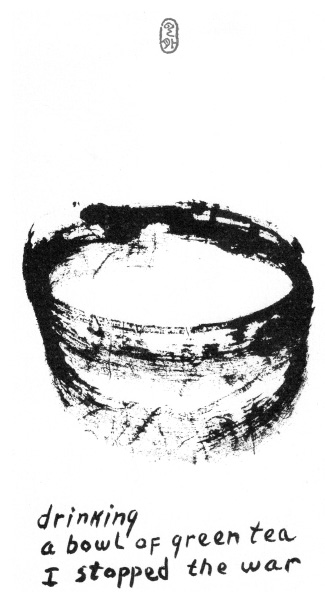PAUL REPS
Paul Reps (1895–1990) introduced generations of American readers to East Asian philosophy and religion with his beautifully illustrated collections of Buddhist stories, haiku-influenced poetry, and writings on Buddhism like Zen Flesh, Zen Bones (1957), Zen Telegrams (1959), and Square Sun, Square Moon (1967). He personally practiced what he called “Reps Zen,” freely adapting various traditions.
Several accounts have circulated about the origins of his poem “drinking a bowl of green tea”—first published in Zen Telegrams—all of them possibly apocryphal. According to one, he hoped to travel to Kyoto to visit with a particular Zen master, but was denied a visa: nonmilitary travel to Japan, then the main staging area for UN troops heading to Korea, was routinely discouraged. Disappointed, he poured himself a cup of tea, savored it, and made another appeal to the visa clerk, who finally granted his request.

What “war” it was that Reps stopped, drinking his cup of tea, is open to question—his conflict with a visa clerk, his inner turmoil, or even, wishfully or prayerfully, the larger war out in the world. The relation between such “inner” and “outer” wars is important in antiwar writing—it is what is at stake in Gandhi’s injunction to “be the change you seek in the world”—and Reps’s poem raises it powerfully and without fuss.
In a recent course I taught on the writing in this anthology, Reps’s poem split the class down the middle; half the students loved the association it made between inner and outer war, half of them ardently rejected it. None were indifferent.